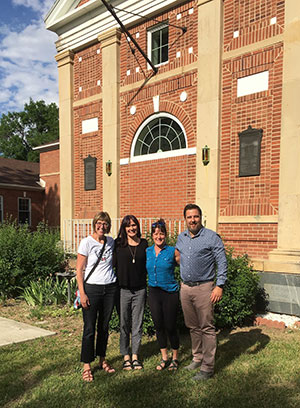Three UW Faculty Members Research Wyoming History in Developmental Disability Care
Published August 19, 2021

Three University of Wyoming College of Health Sciences faculty members were awarded funding through the Equality State Research Network to develop a partnership with the Wyoming Life Resource Center (WLRC) in Lander.
Erin Bush, an associate professor with the Division of Communication Disorders; Michelle Jarman, an associate professor with the Wyoming Institute for Disabilities; and Sandy Leotti, an assistant professor with the Division of Social Work, are the awardees.
The WLRC, formerly named the Wyoming State Training School, opened in 1912 to provide residential care and education to people who would now be diagnosed with intellectual and developmental disabilities.
Historically, state schools, such as the WLRC, became custodial in nature, where people were confined, often for decades or lifetimes within the institution. Over the years, the WLRC has changed dramatically. In response to disability rights and advocacy efforts resulting in deinstitutionalization, long-term residents were reintegrated into communities across Wyoming decades ago.
Today, the WLRC is undergoing another transformation by providing temporary residential health services to individuals with complex and significant needs. The new mission of the facility is to fill a gap in services for people who are not able to access appropriate supports in their communities.
“Our research project seeks to investigate the long history of the Wyoming Life Resource Center, from the early decades as a state training school through deinstitutionalization, to its current incarnation as a health care facility for people with significant disabilities and complex support needs,” Bush says. “Through documenting the history of the institution as well as its current transformation, we aim to bring the history of deinstitutionalization to light through archival research and contemporary oral histories.”
Bush has been a certified speech-language pathologist for 17 years. For over a decade, she has conducted collaborative and interdisciplinary research with and for people with disabilities. As a qualitative researcher, Bush aims to gain a deeper understanding of health care and educational issues impacting groups of marginalized people.
Leotti’s work critically examines the politics of social work and social welfare. A significant portion of her research and practice experience has been aimed at understanding and impacting health disparities in the lives of people with disabilities.
Jarman brings a social and historical perspective to the project. As a disability studies scholar, she has investigated and taught students about the history of institutionalization, especially the impact of segregating people with intellectual and developmental disabilities. She is interested in the research and pedagogical value of documenting oral histories of deinstitutionalization, especially in the rural frontier context of Wyoming.
Through this project, the goal is to develop a partnership not only with the WLRC, but also with former residents, families, community members and other stakeholders to document a multilayered history of the institution and its connections to residents, staff members, families, communities and the state of Wyoming. The first prong, being more archival in nature, seeks to understand the institution and its operations, specifically prior to the 1970s.
The second prong, focusing more on the years leading up to and following deinstitutionalization, will involve identifying people involved in the former state school who are interested in recounting oral histories.
“Using a community-based participatory approach to inform our historical research, we also will rely upon community participants to identify local and statewide health, disability and social integration issues relevant to this project,” Bush says.
Through this process, the hope is to identify health and other disparities that have been produced through the process of deinstitutionalization and community reintegration in rural communities. These disparities can then be targeted in future research. Furthermore, the development of this partnership will lead to future collaborations, which can specifically examine the experience and impact of rural community reintegration, including gaps in support or services, and the relationship of these on the health and well-being of WLRC’s residents.
“We are in the initial stages of this project, having just completed our first trip to Lander,” Bush says. “We had meetings about partnership directions and processes of identifying stakeholders. We received a campus tour of newly constructed buildings, and we were able to review some archival documents and pictures regarding the original buildings and setup of the campus compared to the modern-day design.”
The three UW faculty members also were able to view historical newspapers and other public documents, such as articles about the building of the infirmary, as well as materials from the 100th-year celebration. They met some WLRC employees and gained further insight into this unique history and aspects of the evolution of the facility. Off-site, the team will continue to research the institution from publicly available records, such as state reports, administrator publications, relevant history and news articles.

